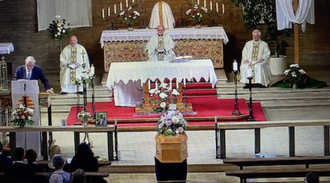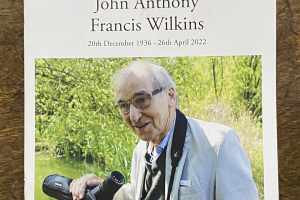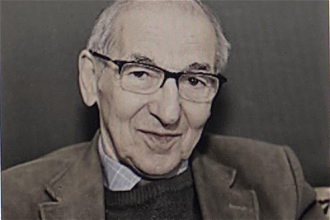Eulogy for John Wilkins by John Cornwell

Screenshot
Author John Cornwell gave the following eulogy at the Requiem Mass of John Wilkins yesterday, 7th June, at the Church of Holy Apostles in Pimlico, central London.
I first met John almost 40 years ago when I invited him to an editorial lunch at the Observer. I didn't know him, and our mutual friend, Michael Walsh was the go between. It was the early days of the Polish Solidarity crisis.
On Poland, East Europe and the Soviet Union,The Tablet's coverage was incomparably better than ours. Despite Bill Keegan and Hugh O'Shaughnessy on the staff, The Observer didn't do religion, religion was gobbledegook, said one senior editor and we don't do gobbledegook even to debunk it. The Tablet didn't do gobbledegook either, but it did do religion, of course, seamlessly integrated with in depth history and culture of Eastern Europe, a grasp of Cold War politics, the labyrinths of Latin and Orthodox Christianity: the unfolding epic of John Paul II's papacy; convincing analysis, authoritative leaders, eye-witness reportage, from Poland, much of it by the tireless Peter Hebblethwaite, and penetrating interviews.
Over lunch Joh Wilkins quizzed us with skill and politesse, and listened intently; when he disagreed it was with tact.
John and I became friends, and his friendship soon took in the ambit of our entire family.
So we got to know John in many circumstances We travelled together. We have seen John in a wet suit and scuba equipment diving over the side of a panga to explore marine life off the coast of the Galapagos, we have a hilarious memory of John on North Ronaldsay, in the Orkneys, in hot pursuit of a rare rednecked phalarope wader gull…
- John himself frantically squawking like a rare sea gull: quick, quick quick, look look look.
His achievements as editor of the Tablet have been widely celebrated in the weeks since John died; and I want to say how grateful we all are to Brendan Walsh and many contributors for the far ranging appreciations of John published in the Tablet since his death. But there's a dimension of his life less referenced. A year ago John wrote to me hinting that his links and involvement with Cambridge might be overlooked. When Fr Pat told me that John had asked me to speak at his funeral Mass: mention of Cambridge now seemed important.
Many of you will remember the story of John as a student on vacation from Cambridge Back home in Bristol, he was attending evensong at St Mary Redcliffe - when he experienced an inclination of the heart leading to the acceptance and realisation of his Christian baptism as a mature decision.
He quit the classics department and joined the Divinity School where he came under the felicitous influence of Donald MacKinnon, the philosopher famous for "open textured" Theology: the perspectives of history, literature, art, music, politics.
Mackinnon encouraged further in John what I believe was already there - a questioning, open, temperament: that became abundantly and fruitfully receptive to the great spiritual, and pastoral drama of the Second Vatican Council - and so John became a Catholic.
After graduation John moved to London but he continued to maintain a parallel existence in Cambridge where he had many friends: Teresa Maclaine, the Bretts, Owen Chadwick, Elizabeth Anscombe, Eamon Duffy, Nicholas Lash, Tim Smiley, Janet Sokice. He was conscious of a great debt to the university, and to Clare College.
In 1990 he was instrumental in raising significant start up funds for a public understanding of science program through an annual conference - Each meeting chose a current topic in science that appeared to be saying something challenging about Nature, Human Nature, and Society. Scientists, people from the humanities and social sciences, and, crucially, journalists were invited.
At the heart of the initiative was a preference for pluralism over fundamentalism. This was the era of best selling fundamentalist, reductionist media celebrity guru scientists: Stephen Hawkins peering into the Mind of God; Richard Dawkins and his Selfish Gene, Dan Dennett and his explanations for everything. Other voices, more open, more holistic - Mary Midgely, Maggie Bowden, Martin Rees, Freeman Dyson, John Barrow - were pitched against the reductionists at the Cambridge conferences, prompting articles in periodicals as varied as the New York Review of Books, Nature Magazine, New Scientist and of course the Tablet.
John had a genius for friendship, Melanie McDonagh tweeted just after John died, how he had spent a weekend with her father in law who doesn't have a word of English, by Sunday evening they were the best of friends.
John had wonderful way of engaging: he always found a way of getting onto your wave length. He encouraged many young writers, and older ones too; he was always eager to help with an article, to give of his time, reading a manuscript however long. There were a surprising number of voluntary activities…He became a highly effective trustee of a Catholic family charity with projects relieving poverty from Ecuador to Uganda.
Just over the age of seventy John was diagnosed with cancer. He had much discomfort and anxiety; he never complained, he continued to work. On waking each day, he told me, he sang out loud John Keble's hymn: "New every morning…"
Into his eighties he suffered balance and back problems: there were falls, once down an escalator. "I'm fine, " he said. "When I was at Clifton I played scrum half …taking a tumble is OK if you know HOW to fall." In the army he was welter weight champion of his battalion: I once asked his secret: "two things: lightening speed, and a very hard punch."
John had a chortling, agreeable, supportive sense of humour. I never heard him utter a spiteful, or vulgar word or phrase; despite membership of a profession given to self-mythologising and bragging, I never once heard him utter a boast or complain of injured merit; the fullest extent of his expletives was a PG Woodhouse, Oh Lord!
He loved women: and they loved him.
Yet there was an element of winning artlessness. One night after drink was taken at the scruffy academy club in Soho, John and I were weaving our way down towards the Piccadilly tube when a lady of the night made a saucy proposition in our direction from a darkened doorway We walked on, then John stopped and to my horror went back. Peering over his specs he said: "I do beg your pardon, you seem to know one or the other of us rather well: are you a friend of mine or a friend of my friend."
When John was at the BBC he devised a program where the story went backwards in time…it won a prize. John said he got the idea from a poem by his great friend Sydney Carter poet, musician, and lyricist - author of the wonderful; hymn Lord of the Dance with which we finish this service. John spent every Christmas day with Sydney and his family around the piano (Sydney's son Michael is with us today). The poem is titled:
Run the film backwards…I'll read the first two stanzas…
When I was eighty-seven/ they took me from my coffin;
they found a flannel nightshirt/ for me to travel off in.
All innocent and toothless/I used to lie in bed,
still trailing clouds of glory/ from the time when I was dead.
The conceit is an inversion of Wordsworth's Ode: Intimations of Immortality: Wordsworth, following Plato, proposes that in childhood we have intimations of pre-existence in a celestial world of beautiful forms.
Sydney Carter's poem, reveals intimations of heavenly existence in future retrospect, one might say.
"And what do you expect to be doing in heaven," I would ask.
"What else," he would say, "but be with those one loves; and in my case, one in particular, she who left - far, far too early - ahead of me."
Watch a recording of the Mass here: www.holyapostlespimlico.org/index.php/live/ (Click on 'Recordings and scroll down to 'Funeral Mass for John Wilkins (RIP) 11:00 07-06-2022')

















